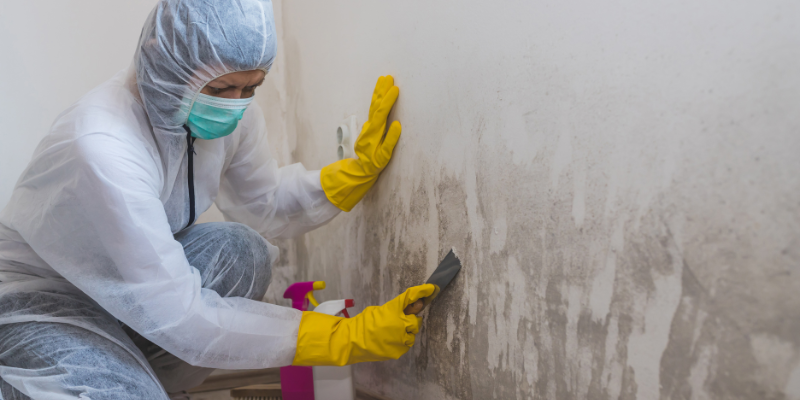
Selling a house with mold can be quite challenging. Mold problems can frighten away potential buyers and make it difficult to secure financing.
Here’s why mold can be a dealbreaker for buyers:
- Visible mold raises concerns about health and safety.
- Buyers may worry about the costs of remediation.
But don’t lose hope just yet! Yes, it is possible to sell a house with mold. By taking certain actions, you can still attract buyers even with mold issues. It’s important to address these problems if you want to sell successfully. Being open about the mold situation and exploring options for fixing it will increase your chances of getting a good price.
Understanding Mold and Its Implications
Mold is a naturally occurring microscopic fungus that plays a crucial role in breaking down organic matter. It thrives in moist environments, needing moisture, oxygen, and food sources like drywall or wood to flourish.
Types of Mold
Understanding the different types of mold is essential:
- Pathogenic Mold: This type can cause infections, particularly in individuals with compromised immune systems.
- Allergenic Mold: Triggers allergic reactions and respiratory issues in sensitive individuals.
- Toxigenic Mold: Produces toxins that can pose severe health risks.
Health Risks of Mold Exposure
Exposure to mold can lead to various health problems, such as:
- Persistent coughing
- Allergies and asthma attacks
- Respiratory infections
The severity of these health issues often depends on individual sensitivity and the extent of mold exposure. Homes affected by mold not only face structural concerns but also significant health implications for occupants. Addressing mold promptly is vital to ensuring a safe living environment and maintaining property value.
Assessing Mold Issues in Your Home
Identifying signs of mold in a home is crucial for any seller. Look for common indicators such as:
- Visible growth: Dark spots on walls or ceilings.
- Discoloration: Stains that appear on surfaces.
- Musty odor: A persistent smell that indicates dampness.
A professional home inspection is essential for thorough detection. Inspectors can spot mold hidden behind walls or in less visible areas. In Texas, where basements are rare, focus on inspecting:
- Attics: Often neglected, they can harbor moisture and mold.
- Crawl spaces: Check under the house for damp conditions.
- High humidity areas: Bathrooms and kitchens require special attention.
Addressing these signs early ensures a smoother selling process and protects your investment. It’s also important to note that mold can pose serious health risks, making it imperative to tackle any issues promptly.
Legal Considerations When Selling a House with Mold Problems
When it comes to selling a house with mold, understanding your legal obligations is crucial. Here are key points to remember:
1. Disclosing Mold Issues
Sellers must inform potential buyers about any known mold problems, including black mold. This disclosure is not just a courtesy; it’s a legal requirement in many states, including Texas and Pennsylvania.
2. Consequences of Non-Disclosure
Failing to disclose mold can lead to serious repercussions. Sellers risk facing lawsuits from buyers who discover mold after the sale. Additionally, non-disclosure can significantly reduce the sale price, as buyers may be hesitant or unwilling to purchase a property with mold issues.
Being transparent about mold problems not only fosters trust but also protects you from potential legal troubles. Documenting all known issues and any remediation efforts can further safeguard your interests when navigating this complex process.
Options for Selling a House with Mold Problems
Finding solutions for selling a house with mold issues requires careful consideration. You have several options:
1. Selling As-Is
This approach saves time and money. It attracts cash buyers or real estate investors who are willing to take on the challenge, but may lead to a lower sale price due to the mold problem.
2. Fixing Issues Before Listing
This option involves hiring professionals for mold remediation. While it requires an upfront investment, it can result in a higher property value and better offers from retail buyers, reducing long-term risks of legal action or reduced sale price.
Consider your priorities. If you need a quick sale, targeting cash buyers may be best. If maximizing profit is your goal, addressing mold issues beforehand can enhance appeal and marketability. Each choice has its pros and cons, impacting both your timeline and potential profits.
Mold Remediation Before Selling: Is It Worth It?

Addressing mold issues before selling a house can significantly impact your sale. Consider these mold remediation options:
- Professional Remediation: Engaging certified experts ensures thorough removal and prevents health risks. They handle extensive damage, ensuring that mold does not return.
- DIY Efforts: For minor infestations (less than 10 sq ft), using a scrub brush and bleach can be effective. However, this approach may not work for stubborn black mold or larger areas.
The importance of tackling extensive mold before listing cannot be overstated. Buyers often shy away from homes with visible mold, fearing potential health hazards and costly repairs. Addressing these issues not only enhances your home’s appeal but also helps maintain its value. A well-documented remediation process can reassure potential buyers, making the selling experience smoother and more transparent.
Other Articles You Might Enjoy:
- How Texas Soil Can Damage Your Home’s Foundation
- Messy Title Problems in Texas: What Every Homeowner Needs to Know
- Selling a Problem Property? Here’s the Fastest Way
- Can You Sell a House with Mold Problems? Yes, Here’s How
- 7 Essential Tips for Selling an Old House Fast In Texas
Impact of Mold on Home Value and Sale Process
Mold can significantly affect home value and mold problems during the sale process. Understanding these effects is crucial for any seller.
Effects of Mold on Home Value
- Interior Mold: Presence inside a home can lead to severe devaluation. Estimates suggest that homes with visible interior mold may drop in value by up to 23%. Buyers often perceive this as a major health risk, leading to reluctance in making offers.
- Exterior Mold: While less detrimental to property value, it still impacts curb appeal. Aesthetics matter. Buyers might question the upkeep of the entire property if exterior mold is visible.
Financing Challenges Due to Mold Issues
Active or undisclosed mold issues pose financing challenges. Many lenders hesitate to approve loans for properties with mold concerns, limiting potential buyers and reducing competition. This situation can trap sellers in a cycle of low offers or cash-only deals, complicating the sale further.
Addressing these issues before listing is essential for maximizing home value and attracting serious buyers.
Preventing Future Mold Growth Post-Sale: A Guide for New Homeowners
Understanding how to prevent future growth after buying a house with mold problems is essential. Here are some effective tips for new homeowners:
1. Ventilation
Ensure proper airflow in all areas of your home. Open windows, use exhaust fans in bathrooms and kitchens, and consider installing a whole-house ventilation system.
2. Moisture Control
Keep humidity levels low. Use dehumidifiers in damp areas like basements or crawl spaces. Regularly check for leaks in pipes, roofs, and appliances.
3. Ongoing Maintenance
- Inspect roof and gutters regularly to prevent water accumulation.
- Clean and maintain HVAC systems to ensure efficient operation.
- Seal any cracks or gaps in walls and foundations to block moisture entry.
These steps help maintain indoor air quality and protect your investment. Implementing these strategies ensures that your home remains mold-free, creating a healthier living environment for you and your family.
Conclusion: Successfully Navigating the Sale Process Despite Mold Issues
Selling a house with mold problems is possible, especially after remediation. Here are key reminders:
- Seek professional help when needed. Mold issues can be complex and require expertise.
- Document all repairs and inspections. Transparency builds trust with potential buyers.
- Maintain open communication throughout the selling process. It eases concerns about mold history.
Addressing mold directly increases your chances of a successful sale. Those challenges don’t have to define your home-selling experience. With the right steps, you can navigate the sale process effectively and secure a fair price for your property.
FAQs (Frequently Asked Questions)
Can I sell a house with mold in Texas?
Yes, it is possible to sell a house with mold in Texas. However, it is important to address the mold issues and take necessary steps to attract potential buyers.
What are the health risks associated with mold exposure?
Mold exposure can lead to various health risks including respiratory issues like coughs and asthma, as well as allergic reactions. Different types of mold can have different effects on health.
How can I identify mold issues in my home?
Common signs of mold presence include visible growth, discoloration on walls or ceilings, and a musty odor. It is advisable to have a professional home inspection for thorough detection, especially in areas like attics and crawl spaces.
What are my legal responsibilities when selling a house with mold?
As a seller, you are legally obligated to disclose known mold issues to potential buyers. Failing to do so can result in lawsuits and a reduced sale price.
Is it worth remediating mold before selling my house?
Addressing extensive mold issues before listing your home is generally recommended. Effective remediation strategies can improve the property’s appeal and potentially increase its value.
How does mold affect the value of my home during the sale process?
Mold problems can significantly impact property value. Homes with active or undisclosed mold may face financing challenges, making it harder to sell at market value.
Disclaimer:
The content provided on this blog is for informational purposes only. We are not attorneys or tax professionals. For personalized legal or tax advice, please consult with a qualified professional.
Written by Lisa Martinez, Founder of TX Cash Home Buyers

About The Company
TX Cash Home Buyers helps Texas homeowners sell quickly and simply — even in tough situations like repairs, inherited homes, or financial stress. Founded by Lisa Martinez, we’re known for our local experience, fair offers, and commitment to guiding sellers through off-market sales with clarity and care.




